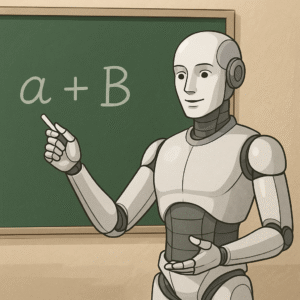Generations of well-meaning parents have encouraged their children to pursue a college degree to attain higher-paying employment. For decades, legacy college degrees have usually paid off for grads with larger paychecks throughout their working career, and a higher standard of living.
As college costs have spiked over several decades, families have been second-guessing the value of a degree in the job market for a while now. Being shackled with student loans past the age of retirement throws water on the entire concept.
Now that we’re in the age of AI, the value of an expensive degree to attain a well-paying job is even more questionable. AI has supplanted many white collar positions, and it’s on track to shake up the job market in ways we don’t understand yet.

Degrees are not dead (yet), but their value is shifting
A college degree still opens doors, especially in medicine, engineering, or other highly specialized fields. But the traditional promise of college — spend four years and tens of thousands of dollars for a guaranteed career — is breaking down even further.
Artificial intelligence is accelerating the shift away from traditional careers, and fields once considered “safe bets.” Finance, marketing, law, and even computer science careers are now at risk of automation.
Students are graduating into a labor market in flux
Millions of freshly minted college grads traditionally sought entry level white collar jobs as a career track at large companies.
AI is reducing demand for white-collar degrees. As you would expect, companies care more about the bottom line than in cultivating new talent. AI tools that can write, code, analyze data, and handle customer service faster than entry-level employees.
Sorry, we’re not hiring
More skilled jobs done by experienced staffers, like report writing, spreadsheet analysis and interoffice correspondence are now handled by AI. Companies may reduce recruitment plans, or even lay off employees.
Sometimes the boss becomes redundant, too
Even management roles are shrinking as software does “boss stuff” like tracking team productivity, manages calendars, and suggests workflows. College grads expecting an easy entry may find AI already doing the job.
In the age of AI, the value of skill sets is greater than diplomas.Taking on $80,000 in education debt is life-changing and should not be taken lightly.
No college degree? In the age of AI, so what?
Adaptability and skill sets matter most in the age of AI.
Moving forward, the most successful workers won’t necessarily have elite degrees from Ivy league universities. They’ll be the ones who learn quickly, pivot easily, and work well with AI.
Soft skills like empathy, problem-solving, and judgment are now more valuable than a generic diploma.
Degree bloat is part of the problem, too
Not so long ago, employers viewed an intelligent person with a high school diploma as perfectly capable of handling an entry-level job.
Then college degrees became the new minimum, even for roles that didn’t truly require them. Employers began demanding a four-year degree—or even a master’s—before they’d consider someone for a low-wage job at the bottom of the totem pole.
We’ve reached the point where “You want fries with that?” requires a diploma.
That may be about to change. Artificial intelligence skills have the potential to replace that paper trail and open doors for people who aren’t headed for college.
Trade schools are making a comeback
Hands-on trades persons are practically AI-proof.
As the cost of college accelerates, and AI changes the job landscape, hands-on careers are looking better than ever. Plumbers, electricians, HVAC techs, dental hygienists, and medical assistants are in high demand.
If your pipes are leaking, a plumber can fix it. Most AI software can’t do what hands-on technicians can do.
Alternative education is growing
Learning via video courses, short-form certifications, boot camps, and online credentials are on the rise.
Many tech companies, healthcare organizations, and manufacturers now prioritize job skills and training over traditional four-year degrees. Self-training in AI tools, ethics, or workflow integration may carry more weight with employers than a transcript.
In short, the less they have to train you, the better. After years of employer degree inflation, this benefits everyone.
Hybrid jobs that may not require a degree
AI is also creating new positions that revolve around AI: support specialists, automation supervisors and AI maintenance staff. These positions often blend soft skills with technical familiarity. These emerging careers reward curiosity and self-guided learning, and not necessarily a four-year degree.
So, is college worth it in the coming years?
That depends on your career plans. If you aspire to be a doctor, engineer, and architect, college is still essential. But for many others, there are better, faster, and cheaper ways to succeed in an AI-dominated economy.
Before enrolling, ask yourself what career door does this degree open, and is there a better way to pursue a career?
Bottom line: For many, the best education path is one that prepares you to work with AI, not compete against it.